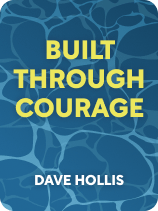

This article is an excerpt from the Shortform book guide to "Built Through Courage" by Dave Hollis. Shortform has the world's best summaries and analyses of books you should be reading.
Like this article? Sign up for a free trial here.
Are you looking for something to motivate you? How can you identify your purpose in life?
Purpose is the driving force that motivates and inspires you, guiding you throughout your life. Your purpose should be your specific talents and unique experiences that you share with others.
Keep reading to learn how to identify your purpose in life, according to Built Through Courage by Dave Hollis.
Identifying Purpose
Everyone has a unique purpose based on their individual talents and experiences. However, it’s likely that you could apply your talents and experiences in multiple ways, making it difficult to determine how best to share your gifts with the world. Hollis recommends looking at the intersection of five components to for how to identify your purpose in life:
Ideals: Pursue your purpose in a way that aligns with the traits and behaviors you value. Hollis suggests identifying your ideals by considering how you want others to describe you and what makes you feel good about yourself. For example, imagine your purpose is to be a film director. Your ideals might include creativity, passion, and spreading happiness.
Enthusiasm: Pursue your purpose in a way that excites and interests you. Hollis suggests identifying what you’re enthusiastic about by considering what you love doing outside of your responsibilities. For example, you might love telling stories to your friends, and you might apply that to your purpose by telling stories through film.
Proficiency: Pursue your purpose in a way that lets you use your skills. Hollis suggests focusing on the skills you’re most proud of and confident in. For example, you might be talented at working collaboratively and directing camera angles, which you can easily apply to your directing.
Positive effect: Pursue your purpose in a way that benefits the world. Hollis specifically suggests considering how your skills can fill a need. For example, as a director, you could tell stories that provide hope and encouragement to marginalized and disenfranchised people.
Financial stability: Pursue your purpose in a way that supports you financially. For example, as a director, you might achieve financial stability by making popular movies.
Identifying the Components of Purpose
Mark Manson disagrees with Hollis that people have an overarching purpose in their life. Instead, he says there are important and unimportant things in life, and the key to a happy and fulfilled life is only doing the important ones.
However, the questions Manson suggests asking yourself to determine which activities are important fit well with Hollis’s five components of purpose. We’ve consolidated his questions and grouped them into Hollis’s categories so you can use them to identify your purpose.
- Ideals: What’s important enough that you’ll inconvenience or embarrass yourself over it? If you were going to die in one year, what would be most important for you to do in the time you have left?
- Enthusiasm: What do you care enough about that you’re willing to accept any downsides that come with it? What absorbs your attention so much you forget to eat?
- Positive effect: What is a problem you care about solving? How can you help solve it?
Proficiency and financial stability: What skill are you willing to learn and practice until you’re proficient and can support yourself using it? What are you willing to dedicate yourself to?
Why These Components Are Important
When you choose a path in life that fulfills these five components, your life will feel more meaningful, happy, and fulfilling, Hollis says. If you can’t choose a life path that fulfills all five, choose one that includes as many components as possible and then work on incorporating the others.
For example, imagine you want to be a motivational speaker. You’re enthusiastic about and proficient in public speaking, and helping others has a positive effect that aligns with your ideals. You can’t financially support yourself by motivational speaking, though, so it isn’t feasible to make this your sole source of income. To fulfill this final component, you work as an accountant and save money for a few years while you work on launching your career as a motivational speaker.
The Components of Purpose and Maslow’s Hierarchy of Needs
Hollis says that living in alignment with the components discussed above is the key to a meaningful, happy, and fulfilled life. This is arguably the case because each of these five components addresses a key human need.
Maslow’s Hierarchy of Needs outlines the things you must attain to find self-fulfillment. Maslow defined five tiers of this hierarchy:
- Physiological needs: biological requirements for human survival
- Safety needs: the need for order, predictability, and control in life
- Belonging needs: emotional needs for interpersonal connections
- Esteem needs: the need to be accepted and valued by yourself and others
- Self-actualization needs: the need to fulfill your potential and find self-fulfillment
By living a life that encompasses Hollis’s components, you can fulfill these needs:
- Financial stability fulfills physiological and safety needs: Fulfilling your financial obligations is essential to meeting basic human needs such as food and shelter, and the ability to meet these needs will help you feel safer and less anxious.
- Having a positive effect fulfills belonging and esteem needs: Helping others builds connections, improves self-esteem, and can garner respect and appreciation from others.
- Living by your ideals fulfills esteem needs: It boosts self-esteem and well-being.
- Proficiency fulfills esteem and self-actualization needs: Mastering a skill increases confidence, self-esteem, and respect from others, and it can help fulfill your potential.
- Enthusiasm fulfills self-actualization needs: Positive feelings like interest, excitement, and happiness help you succeed—or as Maslow says, fulfill your potential.

———End of Preview———
Like what you just read? Read the rest of the world's best book summary and analysis of Dave Hollis's "Built Through Courage" at Shortform.
Here's what you'll find in our full Built Through Courage summary:
- Why the key to a fulfilled life is achieving your unique purpose
- How to identify and achieve the role you're meant to fill
- How to overcome the two barriers to reaching your potential







Thank you so much for your ideas. I learned from it and I will make sure it be part of me as a tool to work with.
However, I also understand purpose to be a reason or an aim for someone to be in session or an area to achieve a goal.